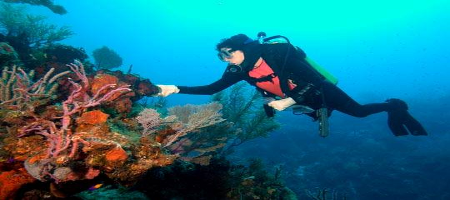Marine Science
Marine science is a gateway for all forms of general oceanography, physical oceanography (tides, waves, etc.), chemical oceanography (sea salts, properties of water, etc.), geological oceanography (mid ocean ridges, sea floors, hydrothermal vents, and other geologic things), and engineering (underwater technology.) Also, biological oceanography is kind of like ocean ecology. The field of Marine biology studies about the ocean life. In other words marine biology is studying more individual organisms and biological oceanography studies the whole ecosystem and its interconnections.
Key to Success
To be successful in Marine Science you should have/ develop:
- Above average intelligence
- Comfortable in the water
- Ability to concentrate for long hours
- SCUBA diving
- Creativity
- Capacity for original thoughts -curious
- Perseverance
- Going to the bottom of the problem
- Constantly acquiring knowledge
Scope and Opportunities
Marine scientists are involved in research, analysis and forecasts in relation to the oceans, their life forms and coastal areas. They examine the sea and its interaction with the land, atmosphere and sea floors and use the information gained to predict changes to the earth’s infrastructure, inform statutory legislation and encourage environmental protection.
Marine science is a broad-ranging field that covers subjects as diverse as:
- Coastal processes
- Geology and geophysics
- Marine biology
- Oceanography, ocean modeling and forecasting
- Bio-geo-chemistry and ecosystems dynamics
- Hydrographic surveying
A career as a marine scientist offers many chances to travel and explore the world! You can find marine scientists:
- Working on ships
- Working as laboratory technicians on shore
- Managing fisheries
- Educating others about marine conservation
Lifestyle & Social Status
- It’s mostly an outdoor activity
- Working in labs.
Job Profile
Work activities may be office, laboratory or field-based, including work on sea-going vessels, and may include:
- Collecting samples and data using processes such as coring techniques, GIS systems, visual recording and sampling;
- Working with computer databases and specialist software to analyze information, e.g. to carry out population assessments of particular species or evaluate ongoing damage to coral reefs in a narrowly defined area;
- Preparing detailed reports, such as environmental impact assessments, for agencies, commercial organizations or governmental bodies,
- Designing scientific experiments, collating findings and often designing and building the appropriate equipment;
- Building new research theories and testing hypotheses;
- Conducting sea-based sampling and experimentation, involving periods on sea-going vessels;
- Preparing research papers for journals and other specialist publications and presenting research findings at conferences;
- keeping up to date with new research and technologies and attending training courses;
- Advising on matters such as climate change, sea-based energy technologies and environmental impacts;
- If based in an academic institution, lecturing on specialist subjects and supervising Masters and PhD students;
Skill Sets
- Critical Thinking
- Analytical skills
- Complex Problem Solving
- Judgment and Decision Making
- Solid mathematical skills
Work Value
- Challenging
- Team Work
- No monotony in work
- Innovation
Current Job Scenario
Marine scientists are employed by universities, international organizations, commercial companies, government agencies, not-for-profit organizations and marine research institutes. While all roles require good general expertise and scientific abilities, specialization in one particular area, such as coastal management, fisheries biology, mathematical modeling of ocean change, ecosystem dynamics or chemical risk assessment, is usually required for progression in the profession
Top Recruiters
- Government Organizations
- Teaching sector
- Private companies
- SMEC automation pvt ltd
- American cruise lines
- GMMCO limited
- GE Shipping Co. Limited
- Carnival Cruise line
- TMC shipping pvt ltd
- IIT shipping pvt ltd
Course Synopsis
| Course Options | Bachelor in Marine Science | M.Sc.in Marine Sciences, Oceanography, Zoology, Life Science |
| Academic Eligibility | 10+2 with PCMB | B.Sc. |
| Fees | Rs. 20k to 30k per annum | Rs. 40k to 50k per annum |
| Expenditure in Metro and Tier-1 | Rs. 2 lakhs to Rs. 2.5 lakhs | Rs. 2 lakhs to Rs. 2.5 lakhs |
| Expenditure in Tier-2 | Rs. 1.75 lakhs to Rs. 2 lakhs | Rs. 1.75 lakhs to Rs. 2 lakhs |
| Duration | 3 Years | 2 Years |
| Mode | Regular | Regular |
| Specialization | ||
| Entrance Exam | ||
| Education Loan | ||
| Scholarships |
Career Prospect
- Research associate
- Assistant professor
Entrance Exam
For BE / B.Tech in Marine Engineering – JEE Mains / JEE Advance
Indian Maritime University Common Entrance Test (IMU CET)
Success Stories

